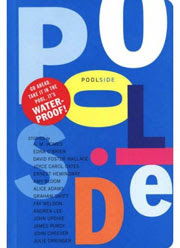About ten years ago, I ghost wrote a daily radio program for a bestselling author. They were short pithy daily reminders for the listener which were one-minute in length. This author recorded the programs and sent them to radio stations around the country who played them for free since they fell into the Public Service Announcement category (PSA). I wrote over 300 of these programs and provided a steady stream of material going out to the radio community and reminding the listening audience about this author. It was a simple and effective strategy. I don’t know if the program continues today or not. This daily challenge is a powerful tool. My question today is: Are you incorporating some daily action into your life to build your writing career or boost your latest book?
The June 11th issue of Publishers Weekly used Christopher Lee Nutter's article in the Soapbox Column called Author, Media Savant. While his book is a year old (ancient in terms of most publicity), he is "still on book tour" and a smart author who understands the necessity of continual publicity about his book.
This section was particularly insightful about how magazines and newspapers handle galley copies of new books, "It is true that my 13 years working as a writer and editor at magazines and newspapers has made me savvy. I've been on the other end of the pitch, so I know how to craft one. I also know that most book PR departments simply hurl galleys blindly at the media, using generic lists of publications and dated lists of editors, letting the galleys fall where they may--which is usually on the giveaway table. Countless times I surveyed the cemetery of galleys headed to their early graves, and determined to avoid this destiny at all costs. So way before I ever even met my publicist, I decided to take responsibility for my book's publicity." (I added the emphasis on this last sentence.)
Later in the article, Nutter gives this great attitude, "It's a lot of work and uncertainty, no doubt about it. But it's worth it. I love my book, and I didn't write it for no one to hear about. While it's true that I can't make people buy the book, I can make sure they've heard of it."
With the sheer volume of new books entering the market daily, it's entirely possible that many people h ave never heard of you or your book. Nor have these people heard of me or my books. For example, my Book Proposals That Sell, 21 Secrets To Speed Your Success has been in print for over two years. And new people continue to discover it and use it to accomplish their own publishing dreams. I'm grateful whenever they find it.
ave never heard of you or your book. Nor have these people heard of me or my books. For example, my Book Proposals That Sell, 21 Secrets To Speed Your Success has been in print for over two years. And new people continue to discover it and use it to accomplish their own publishing dreams. I'm grateful whenever they find it.
Each day, I continue to do little things which spread the word about my book. Here's a couple of ideas for you readers of these entries on the Writing Life:
1. Join my affiliate program which is free and takes minutes to fill out the form. But don't just join the program. You need to take the next step and begin using your own affiliate link in emails and banner ads on your websites. Why? Because as people click those banners or emails, if they come to my landing page and purchase the book, then you receive an email of notification (and I do as well). Here's the great news: after the 60 day guarantee period, I send you 50% of the commissions--for any of my products. For example, with Book Proposals That Sell in the ebook format, that means $19.50 each time someone buys it that you have led to the site. There are even greater payments with other products such as Editor Reveals Book Proposal Secrets.
2. Use my free articles in your own newsletter or website. I've got these articles for anyone to use them so feel free--and I do have plans to add to them.
Take your long-range goal and put it into smaller pieces and attack it every day. Some of your efforts will begin to reap rewards.
Labels: affiliate, book proposal, book proposals, Book Proposals That Sell, Christopher Nutter, daily, ghost, Publishers Weekly





























